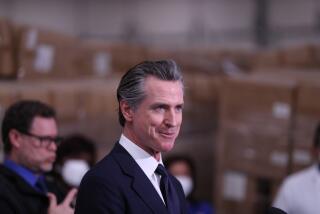Governor preaches post-partisanship in D.C.
WASHINGTON — Before wrapping up a three-day visit, Gov. Arnold Schwarzenegger went to Capitol Hill on Tuesday to sell his gospel of political cooperation and build a consensus for his second-term agenda.
Much of the day went smoothly, with House Speaker Nancy Pelosi and U.S. Sen. Barbara Boxer signaling support for the governor’s plans. Then he stopped in to see the senior senator from California, Dianne Feinstein.
Clearly the governor has not yet made a convert of Feinstein. She seemed baffled not just by his goals but also by the way he has branded them. The two made an appearance before reporters that was rare for its spontaneity.
Feinstein was asked about the governor’s “post-partisan politics,” his phrase for how Republicans and Democrats in Sacramento are hatching ideas in concert, rather than working at cross purposes.
“Post-partum politics?” Feinstein said, perplexed.
The discussion turned to Schwarzenegger’s plans to strip state lawmakers of the power to draw congressional and legislative voting districts. His hope is that an independent commission would carve maps that would create more competitive races. A panel of county clerks would choose candidates for the commission.
Feinstein didn’t know those details and seemed skeptical about the project. “Who would do it?” she asked.
“The people of California would draw the district lines,” the governor said.
Feinstein: “The people would draw? How many people?”
Schwarzenegger: “So it’s going to be fun.”
Feinstein laughed. “Oh, yes. I think I ought to study it some more.”
Next up was Schwarzenegger’s call for a pause in campaign fundraising while the state budget is being negotiated. Schwarzenegger has broken California fundraising records, collecting more than $100 million. On this trip, he raised $150,000 in campaign donations at an event at a cigar bar.
Feinstein asked if the ban would apply to the governor.
Schwarzenegger: “For the governor. Mostly for the governor.”
On one point, the two seemed to agree. Feinstein said she dislikes term limits for lawmakers, and asked how Schwarzenegger felt. The governor answered that he had never been “a big fan of term limits.”
During the 2003 recall campaign that swept him into office, Schwarzenegger issued a statement saying the opposite. At the time he said he liked the idea of “citizen-legislators” and thus was “a big believer in term limits.” The statement is still posted on his website.
On Tuesday night, the governor finished his trip, a whirl of meetings with President Bush, U.S. Health and Human Services Secretary Mike Leavitt and various governors and lawmakers.
Schwarzenegger is unhappy with the president’s proposed budget. This week, he sent Bush a letter opposing cuts in vocational education, job training and Medicare and Medicaid programs. Schwarzenegger met alone with Bush in the Oval Office on Monday, and the two spoke about the governor’s bid to provide health insurance for every Californian.
“I told him how important it is that the federal government and he helps us, in order for us to make our agreement a reality,” Schwarzenegger told reporters. “And that we could lead all the other states and the other states kind of follow us ... and we need his help.”
Schwarzenegger said Bush “was very interested in what we want to do.”
Everywhere Schwarzenegger went, he invoked Sacramento as a model of healthy political collaboration. Asked if he expected that message to stick once he flew home, he said he simply needed to keep repeating it.
“I will travel around the country with our message,” he said. As the presidential campaign heats up, he said he would go to other states to deliver speeches about “working together and being inclusive. Serving the people and not the party or ideology. That we will talk about a lot.”
Some members of Congress who met with the governor said they liked his approach. U.S. Rep. Zoe Lofgren (D-San Jose) said after the meeting: “I am hopeful that today’s meeting represents the start of a successful partnership with the governor and within California’s congressional delegation to work together on funding issues that benefit our state.”
But as Schwarzenegger touted successes in Sacramento, there were signs back home that the two-party consensus might be more fragile than he was letting on.
One of the achievements Schwarzenegger mentioned in his interview on CBS’s “Face the Nation” on Sunday was legislation signed last year creating a market-based system to ease greenhouse gas emissions. But even as Schwarzenegger cited that agreement, a key Democrat was saying it did not go far enough.
Senate President Pro Tem Don Perata (D-Oakland) released a statement that seemed to belittle an accord that Schwarzenegger signed this week with the governors of four other Western states. All committed their states to setting up targets for greenhouse gas reductions intended to curb global warming.
Perata reminded Schwarzenegger of a package of bills pending in Sacramento that would also cut emissions. Schwarzenegger’s office has said he opposes such legislation.
A better approach is to give California’s new market-based carbon-reduction system time to work, the governor’s office said.
In an interview Tuesday, Perata said: “I’m happy the governor is continuously talking about this, but unless we can get him other bills to sign that will do practical things to reduce carbon emissions it will be rhetoric, not real.”
*
More to Read
Get the L.A. Times Politics newsletter
Deeply reported insights into legislation, politics and policy from Sacramento, Washington and beyond. In your inbox three times per week.
You may occasionally receive promotional content from the Los Angeles Times.










